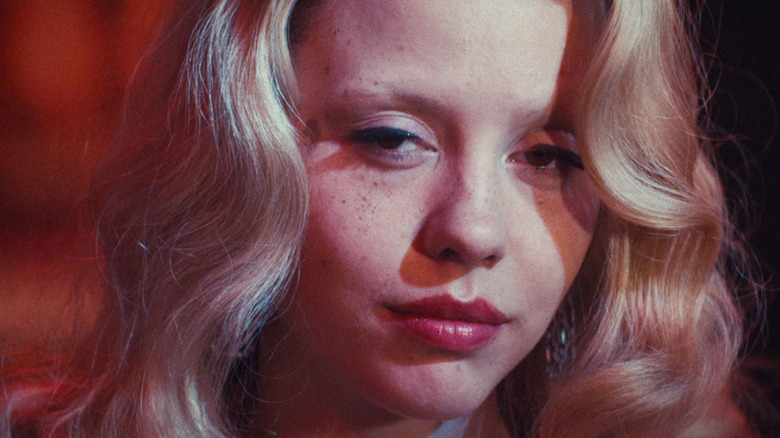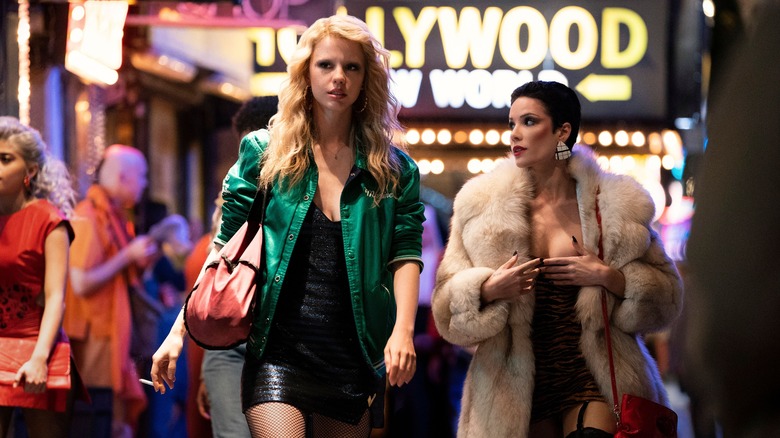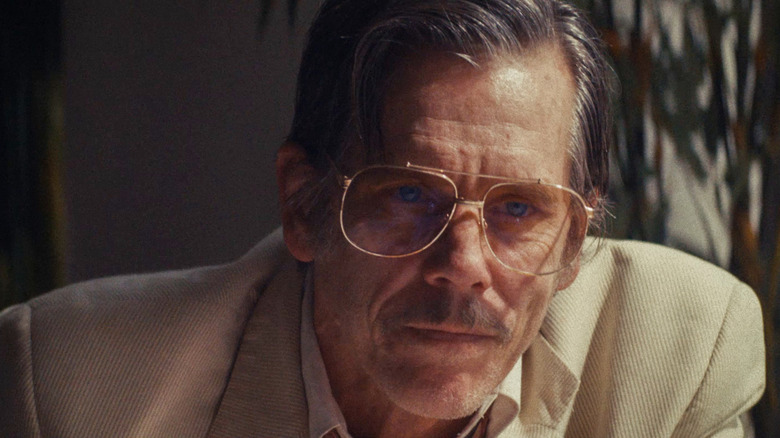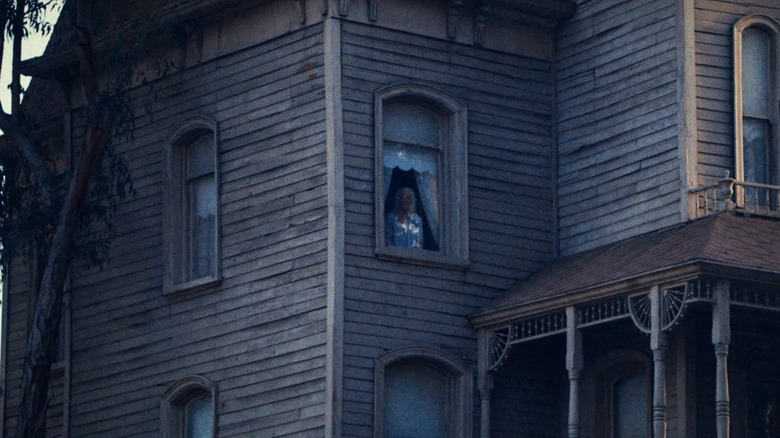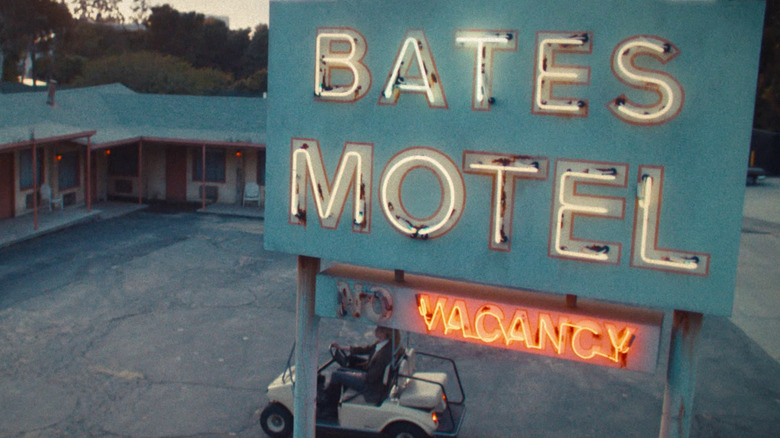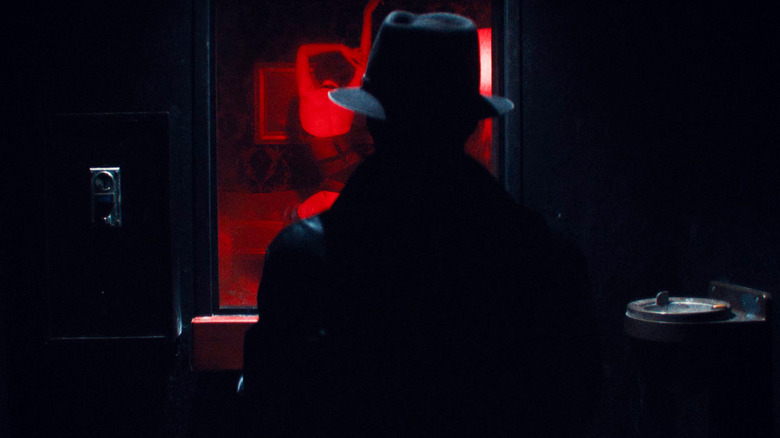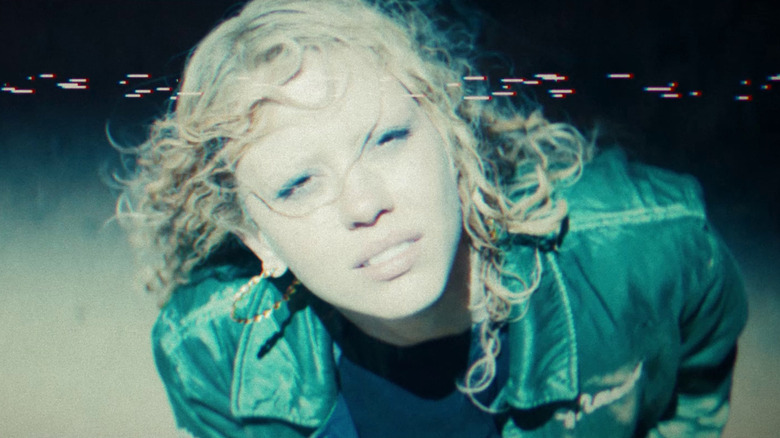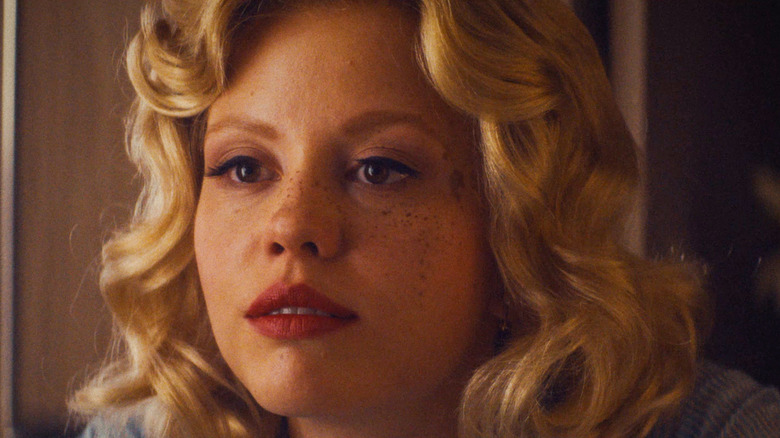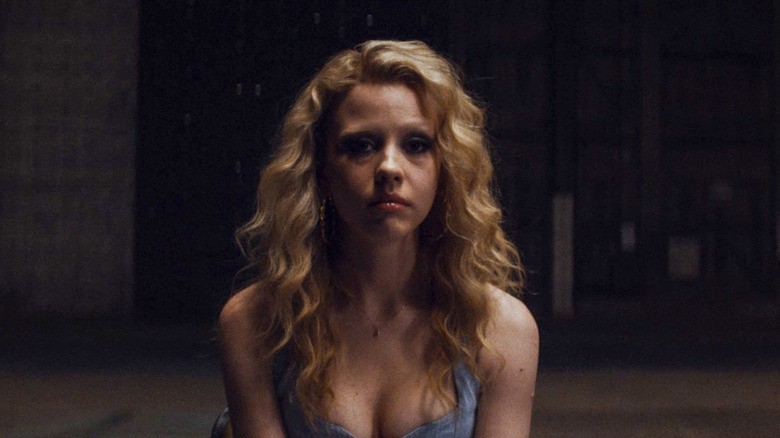MaXXXine Ending Explained: How To Get Ahead In Showbiz
This article contains massive spoilers for "MaXXXine."
If you want to know the real history of Hollywood in all of its dreamlike, terrible, grimy beauty, you would do well to study the horror film. It's the genre where many pillars of the film industry get their start and one that comments on the darkest aspects of human nature and filmmaking itself without fear of overstepping. Think of Wes Craven's "Scream" quartet: not only do all four films make blatant comments on the contemporary state of the industry, but "Scream 3" even features a character who, in hindsight, is a thinly-veiled version of serial assaulter Harvey Weinstein, an executive producer on the film. The calls were coming from inside the house.
Being a horror movie fan involves not just things like separations of art from the artist, but varying gradations of morality, with so many ethical questions constantly at the forefront of these films. Sure, you can simply be a fan of boobs, blood, and barbarism, but great horror films constantly have us wrestling with why that is. Writer/director Ti West's "X," from 2022, explored those themes and more, attempting to reconcile such industry-specific topics like the equation of pornography with horror as well as larger social issues like ageism, the coveting of youth and fame, and more. "Pearl," the prequel to "X," delved into how Hollywood's dream factory can skew one's worldview so horribly that a dream deferred can be deadly.
Now, West and his muse, Mia Goth, have returned with the trilogy's final chapter, "MaXXXine," which sees Goth's titular adult performer aspiring to Hollywood stardom. Through the film, Maxine and "MaXXXine" demonstrate how success in such a business requires literally surviving (if not eradicating) one's past, something that may only be possible for a Final Girl who's in touch with her own strength and darkness.
Maxine's silk stalkings
"MaXXXine" begins with footage from 1959, where a young Maxine Miller (Charley Rowan McCain) dances a very "Pearl"-esque dance on camera for her father, the fundamentalist preacher Ernest (Simon Prast). He gives Maxine his special mantra, "I will not accept a life I do not deserve," a phrase repeated throughout the film and "X."
26 years later, in 1985 Los Angeles, a now 33-year-old Maxine Minx (Mia Goth) has traded the emptiness of rural Texas for the glitz of Tinseltown and is auditioning for "The Puritan II," a horror film directed by the illustrious Elizabeth Bender (Elizabeth Debicki). After once again proving her thespian prowess, Maxine exits the audition triumphantly before heading over to one of her current gigs — shooting porn in the back of a strip club. Her friend/coworker Amber (Chloe Farnworth) criticizes Maxine's workaholic nature, inviting her to a party in the Hollywood Hills to meet some rich men. Maxine declines.
Fortunately, her hustle has paid off and she's landed the "Puritan" gig. Maxine celebrates with her friend Leon (Moses Sumney), a gay man who runs the video store beneath her apartment. Leon warns Maxine that no porn stars have become A-listers, but Maxine can only think of the movie stars who got their start in horror as she runs off to another gig as a viewing booth girl on Hollywood Boulevard.
Even as Maxine and her friend Tabby (Halsey) discuss being safe while the Night Stalker serial killer is leaving bodies around the city, Maxine has no idea that a black-gloved man has been watching her all night. Tabby also tries to invite Maxine to the party in the Hills but she again declines. She's not to be deterred or messed with, a fact underlined by the way she deals with a creep dressed like Buster Keaton (Zachary Mooren) who stalks her in an alley: she turns the tables on him, making him strip before literally busting his balls.
The past screams for Maxine
Just as Pearl (also Goth) couldn't escape her own failures, misdeeds, and regrets, Maxine is still haunted by her past. Having fallen asleep while she and Leon were watching the original "The Puritan," Maxine is horrified to discover that someone's left a videotape at her doorstep, the footage of the abandoned porno she and her colleagues were shooting during "X." Asking Leon to try and trace where the tape was made, Maxine runs off to get her head cast for her part, a process which makes her uncomfortably recall Pearl's words of doom to her — that Maxine was destined to end up just like her. Maxine has a panic attack, pulling away the goop that covers her youth just like Pearl's withered, aged skin.
Across the city, Detectives Williams (Michelle Monaghan) and Torres (Bobby Cannavale) discover the mutilated bodies of Amber and Tabby, the latter's murder we see some of, having been recorded in a very snuff-like fashion which recalls 2012's "V/H/S" (which West shot a segment for). The women have been mutilated and branded with pentagrams, leading the cops to believe that they're new Night Stalker victims, yet the detectives don't quite buy it.
Meanwhile, Maxine receives a threatening note with proof of her real name, and upon contacting the number on it is led to a meeting with the slimy New Orleans private dick, John Labat (Kevin Bacon). Labat reveals that he's after Maxine on assignment from a mysterious, wealthy client who cannot be bought. He gives Maxine an ultimatum: she's to appear at a house in the Hills that night, otherwise, the evidence of her involvement in the murders in Texas in 1979 will be exposed. Once again, Maxine declines the invitation.
Maxine receives some Pearls of wisdom
Whoever is after Maxine is not to be so easily ignored. The black-gloved killer attacks poor Leon, his blood splashing over the horror VHS tapes he'd been watching so religiously. The following morning, Maxine is distraught upon seeing the cops bring out Leon's body, and Williams and Torres try to pump her for information. Maxine refuses to budge, giving a rejoinder to Williams' plea for her to help save the next victim by saying, "Maybe the next girl should save herself. That's what I did."
Arriving at the studio lot late, Maxine is reprimanded by Elizabeth before being introduced to Molly Bennett (Lily Collins), the actress from the original "Puritan" returning for flashback scenes in the sequel. This flashback involves some religiously charged imagery where Molly's character bites into a bloody apple, and Elizabeth takes it upon herself to add much more blood to the scene. Molly later informs Maxine outside her trailer that Elizabeth is stern but loyal, and believes that being in the filmmaker's good graces will propel her to stardom. As evidence, she reveals that she's attending an exclusive party at a producer's house in the Hills that night.
Later, Maxine encounters Elizabeth, who scoffs at the protestors at the studio gates who represent the moral majority against horror movies and "The Puritan II" in particular. Taking Maxine under her wing, Elizabeth explains how the suits didn't want to hire her, believing a porn star would suddenly make an occult horror movie distasteful. Elizabeth takes Maxine to see the house from "Psycho" that's on the lot and tells her that she's willing to back her all the way due to her special, X-factor attitude in that earlier audition, where she told the panel that they should cast her because she's a star, full stop. Maxine is still too haunted by her past to hear Elizabeth, however, as she sees a vision of Pearl lurking in the window where Mrs. Bates once stood.
Maxine goes Psycho
The presence of the "Psycho" house in "MaXXXine" is an ingeniously layered reference, referring to a moment from "X" as well as the legacy of "Psycho" in general; Elizabeth makes sure to mention that a sequel to Hitchcock's original had recently been filmed. Like "MaXXXine," 1983's "Psycho II" follows a protagonist who's both survivor and predator, an identity that Maxine is encouraged to take on herself when Elizabeth advises her to "squash" whatever's standing between her and her work. "I intend to," Maxine determinedly replies.
As if on cue, Labat turns up on the lot, having snuck inside, and chases Maxine all over the place. Ironically (and fittingly), Maxine takes refuge inside the "Psycho" house and is saved at the last second by a security guard who throws Labat off the lot. Maxine then turns to her agent, Teddy Night, Esq. (Giancarlo Esposito), for help with the dick. Together, they lay a trap for Labat, who has not only had his face busted up by Maxine earlier while stalking her through town, but has also aided and abetted his black-gloved client's killings.
Labat follows Maxine to a nightclub, thinking he has the drop on her when she goes to the bathroom only to find she's escaped through a window. Running outside to the alleyway, he finds Maxine, Teddy, and their filmmaker friend, Frankie (Brad Swanick). The three of them capture Labat and put him and his car inside a car crusher in a remote vehicle graveyard. Labat pleads for his life every which way but to no avail; Maxine's problems are thus literally squashed.
Maxine's date with destiny
Now safe from Labat, Maxine is free to pursue her dream of stardom, yet a news report on the still-at-large Night Stalker reminds her that Labat's client is still out there, and only she knows where to find him. Realizing that she's still got some squashing to do, Maxine heads to the secluded home located directly beneath the Hollywood sign, while she's followed secretly by Williams and Torres. Making her way up to the house, Maxine is horrified to discover that clip of her dancing from 1959, which means that the black-gloved killer is her own crazed preacher of a father, Ernest. He was first seen on TV during the events of "X," making pleas for help finding his runaway daughter as part of his televangelist broadcasts. Since then, Ernest had taken it upon himself to use Labat to track Maxine down, and once he found her, he then sought to remove all manner of sinful distractions surrounding her: namely, her friends.
Yet a flair for the cinematic runs in Maxine's family, for Ernest wasn't content with merely killing off Maxine's companions, but made sure to film the murders as well as other material so that Maxine could become the star of his movie: a Fundamentalist, Satanic Panic-like documentary entitled "Hollywood Exposed." Ernest attacks Maxine, tying her to a palm tree outside while he and his other followers from his church prepare to shoot the movie's climax, wherein Maxine will either renounce her sinful past and rejoin her father's flock or be burned alive, witch trial-style.
Fortunately, Williams and Torres arrive just in time, blowing away the majority of the cult members while Maxine frees herself from her bonds. The mad Ernest, however, slips away up toward the Hollywood sign, causing the Detectives to give chase.
Maxine's dream ballet
Maxine chases after the cops and her father, knowing that this saga needs to come to a definite close before she can achieve her dream. She finds a mortally wounded Torres, attempting to keep him alive while Williams continues to pursue Ernest. Torres, a failed actor, remarks how all the time he's lived in LA he's never been up to the Hollywood sign and is able to leave his mark on the film industry by wiping some of his blood on the sign before he dies. Maxine then continues on and sees Williams, who's been stabbed in the eye with a crucifix, babbling that at least she got her prey.
A few feet away, Maxine discovers the wounded Ernest, who's dying but is not yet dead. Picking up a nearby shotgun and aiming it at him, she sees a helicopter flying overhead. A short while later, Maxine and Teddy appear on a talk show, discussing Maxine's survival of the ordeal as well as her starring role in the much-anticipated "The Puritan II." After that, the premiere of "The Puritan II" sees Maxine fawned over by fans and reporters alike while she trods down the red carpet and gives an interview about the advice she has for aspiring young stars.
The lights flash in Maxine's face, and it's revealed that the entire fugue has been a vision of Maxine's, who's still standing next to the Hollywood sign with a gun on Ernest. The mini-dream ballet of hers tells her all she needs to know: that this is her true star-making moment. After making Ernest join her in a final reprise chorus of "I do not accept a life I do not deserve," she fires, and blows his head to bits.
Maxine's star is born
One month later, Maxine is in her trailer while "The Puritan II" is filming, continuing her time-honored tradition of hyping herself up in the mirror while snorting some cocaine (now, however, she's able to do lines with a $100 bill). Upon joining Elizabeth and the others on set, the director calls for a moment of silence to remember Molly before the shoot continues. Today, the production is shooting footage of a prosthetic severed head of Maxine's character as it lies bloody on a bed.
At the very beginning of "MaXXXine," a quote from Bette Davis is displayed: "Until you're known in my profession as a monster, you're not a star." No one in Maxine's life thinks she's a monster; on the contrary, she's a hero, or at the very least a survivor. Like the real-life citizens who helped capture Richard Ramirez aka the Night Stalker, Maxine is viewed as a girl off the street who's helped stop a vicious killer. Yet we know what Maxine has done in order to make it this far, and we know that she's left a few corpses in her wake. Despite whether or not those people clearly deserved such treatment, murder is murder.
Hooray for MaXXXine-wood
In a way, it turns out that the murderous Pearl's hex has indeed come true: Maxine has ended up just like her, a "'50s housewife" who's become a killer. Yet she's also been able to avoid Pearl's fate of remaining a perpetually unappreciated recluse. In killing Ernest, she's taken a head to get ahead; literally and figuratively, considering the one on the bed. Elizabeth asks Maxine what she's going to do next, now that everyone knows her name. Maxine's new goal is suitably grandiose and dreamlike: "I never want it to end."
To the tune of Kim Carnes' "Bette Davis Eyes" (a song about the seductive power of Old Hollywood glamour), West has the camera fly from the movie set out through the city, to the Hollywood Hills, where Maxine's name has replaced the Hollywood sign. The implication is not that every successful star in Hollywood has committed literal murder in order to achieve their status, but that the film industry is nonetheless filled with people who achieve their dreams due to something monstrous, whether it be ambition, some kind of crime, or just blind, stupid, simple, doo-dah, clueless luck. As "X" and "Pearl" observed before it, "MaXXXine" reiterates that the truth of cinema is a mixture of beauty and horror, something both aspirational and reprehensible. To those of us in love with the medium, we may assuage our morality by decrying the unsavory aspects of the business, but deep down, like Maxine, we wouldn't have it any other way.
